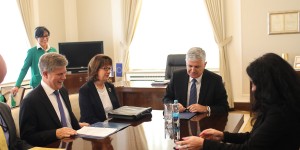The EU is fully committed to play a significant role in the implementation of the status for Kosovo settlement. Therefore, the ministers have decided to intensify the preparation for a future EU and international presence in Kosovo, in coordination with other international actors. 2007 will be the year of the status for Kosovo, but it will also be a year of great responsibilities. The international community and the European Union are playing an important role in the status process, and are preparing to play an important role in post-status settlement Kosovo. Javier SOLANA, EU High Representative for the Common Foreign and Security Policy, on 2 February 2007, expressed his appreciation for the efforts of UN Special Envoy Martti Ahtisaari and welcomed the presentation of his draft comprehensive proposal for a Kosovo status settlement. The international community’s and the EU’s future role is expected to be reflected in the establishment of an International Civilian Office (ICO) and an EU mission in the rule of law area under the European Security and Defence Policy (ESDP). These arrangements are being prepared by two structures: the ICO-EUSR Preparation Team, representing both the international community and the EU, and the European Union Planning Team for Kosovo (EUPT), working for the EU in setting up a future ESDP rule of law mission. The purpose of the ICO-EUSR Preparation Team is: The future international presence in Kosovo after the status settlement is therefore expected to involve an International Civilian Office (ICO), an EU-led mission in the area of the rule of law, an international military presence provided by NATO, an OSCE mission, and a major capacity building effort by the European Community, the World Bank, UNDP, and other partners. The ICO-EUSR Preparation Team plans for an office of around 70 international staff, based primarily in Pristina. The “double-hatted” ICR/EUSR is expected to act The ICR is foreseen to be an EU national, appointed by an International Steering Group following consultations within the European Union. The ICR would report directly to the International Steering Group, that will provide guidance to the ICR. The purpose of the EUPT for Kosovo is to plan for a future ESDP mission that will: The EU is planning for a mission in the range of 1,300-1,500 international police, judges, prosecutors, and customs officials, based in a Headquarter in Pristina or employed throughout the judicial and police system in Kosovo. The Head of the ESDP mission is to be appointed by the Council of the European Union. The EU Political and Security Committee (PSC) is foreseen to provide the political control and strategic direction of the ESDP Mission. The Head of Mission would report to the High Representative for the Common Foreign and Security Policy through the EUSR. Guiding principles for the envisaged international/EU presence in Kosovo: ____________________________________ For further information in Kosovo: ICO/EUSR Preparation Team, Verena Ringler, Press and Public Information Advisor, phone + 381 (0) 38 20 30 – 204, + 377 (0) 44 507 594, verena.ringler@ico-kos.org EU Planning Team for Kosovo (EUPT), Karin Limdal, Press and Public Information Officer, + 381 (0) 38 51 39 – 350, + 377 (0) 44 799 247. Karin.Limdal@eupt-kosovo.eu [1] These clearly specified executive powers would include the authority: to make certain defined appointments in the economic sphere; to investigate and prosecute serious and sensitive crimes, jointly with Kosovo authorities or independently; to annul decisions taken and laws passed by governmental bodies or by Assemblies (at central and local level) which are at odds with the letter or spirit of the settlement; to sanction, or, in extremis, remove individuals. whom he/she judges to be acting in a manner designed to prevent implementation of the settlement.
- ENG
- BHS
- Početna
- O nama
- BiH i Evropska unija
- EU projekti u BiH
- Politike EU
- Poljoprivreda, ruralni razvoj, ribarstvo, sigurnost hrane, veterinarska i fitosanitarna politika
- Preduzetništvo
- Demokratija i ljudska prava
- Razvoj i humanitarna pomoć
- Klimatske akcije
- Multidisciplinarne politike
- Kultura, obrazovanje i mladi
- Privreda, finansije i porezi
- Zapošljavanje i socijalna prava
- Energija i prirodni resursi
- Okoliš, potrošači i zdravlje
- Spoljni odnosi i politika
- Područje pravosuđa, sloboda i bezbjednosti
- Regije i lokalni razvoj
- Nauka i tehnologija
- Transport i putovanja
- Za medije
- Publikacije
- Tenderi i finansiranje
- Šta je EU?
- Ambasadorov blog
- Otvorene pozicije


